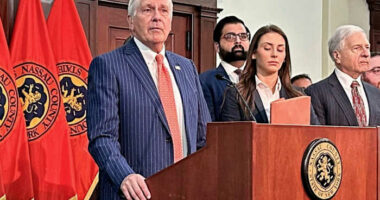Share this @internewscast.com

WASHINGTON (AP) — A federal court in New York dealt President Donald Trump a significant blow Wednesday by blocking his bold plan to impose substantial taxes on imports from nearly every nation worldwide.
A three-judge panel from the U.S. Court of International Trade determined that Trump exceeded his authority when he invoked the 1977 International Emergency Economic Powers Act to declare a national emergency and justify the extensive tariffs.
The tariffs disrupted longstanding U.S. trade policy, interfered with global commerce, unsettled financial markets, and increased the risk of rising prices and recession in the U.S. and globally.
The U.S. Court of International Trade has jurisdiction over civil cases involving trade. Its decisions can be appealed to the U.S. Court of Appeals for the Federal Circuit in Washington and ultimately to the Supreme Court, where the legal challenges to Trump’ tariffs are widely expected to end up.
Which tariffs did the court block?
The court’s decision blocks the tariffs Trump slapped last month on almost all U.S. trading partners and levies he imposed before that on China, Mexico and Canada.
On April 2, Trump imposed so-called reciprocal tariffs of up to 50% on countries with which the United States runs a trade deficit and 10% baseline tariffs on almost everybody else. He later suspended the reciprocal tariffs for 90 days to give countries time to agree to reduce barriers to U.S. exports. But he kept the baseline tariffs in place. Claiming extraordinary power to act without congressional approval, he justified the taxes under IEEPA by declaring the United States’ longstanding trade deficits “a national emergency.”
In February, he’d invoked the law to impose tariffs on Canada, Mexico and China, saying that the illegal flow of immigrants and drugs across the U.S. border amounted to a national emergency and that the three countries needed to do more to stop it.
The U.S. Constitution gives Congress the power to set taxes, including tariffs. But lawmakers have gradually let presidents assume more power over tariffs — and Trump has made the most of it.
The tariffs are being challenged in at least seven lawsuits. In the ruling Wednesday, the trade court combined two of the cases — one brought by five small businesses and another by 12 U.S. states.
The ruling does leave in place other Trump tariffs, including those on foreign steel, aluminum and autos. But those levies were invoked under a different law that required a Commerce Department investigation and could not be imposed at the president’s own discretion.
Why did the court rule against the president?
The administration had argued that courts had approved then-President Richard Nixon’s emergency use of tariffs in a 1971 economic and financial crisis that arose when the United States suddenly devalued the dollar by ending a policy that linked the U.S. currency to the price of gold. The Nixon administration successfully cited its authority under the 1917 Trading With Enemy Act, which preceded and supplied some of the legal language later used in IEPPA.
The court disagreed, deciding that Trump’s sweeping tariffs exceeded his authority to regulate imports under IEEPA. It also said the tariffs did nothing to deal with problems they were supposed to address. In their case, the states noted that America’s trade deficits hardly amount of a sudden emergency. The United States has racked them up for 49 straight years in good times and bad.
So where does this leave Trump’s trade agenda?
Wendy Cutler, a former U.S. trade official who is now vice president at the Asia Society Policy Institute, says the court’s decision “throws the president’s trade policy into turmoil.”
“Partners negotiating hard during the 90-day day tariff pause period may be tempted to hold off making further concessions to the U.S. until there is more legal clarity,” she said.
Likewise, companies will have to reassess the way they run their supply chains, perhaps speeding up shipments to the United States to offset the risk that the tariffs will be reinstated on appeal.
The trade court noted that Trump retains more limited power to impose tariffs to address trade deficits under another statute, the Trade Act of 1974. But that law restricts tariffs to 15% and only for 150 days with countries with which the United States runs big trade deficits.
For now, the trade court’s ruling “destroys the Trump administration’s rationale for using federal emergency powers to impose tariffs, which oversteps congressional authority and contravenes any notion of due process,” said Eswar Prasad, professor of trade policy at Cornell University. “The ruling makes it clear that the broad tariffs imposed unilaterally by Trump represent an overreach of executive power.”












